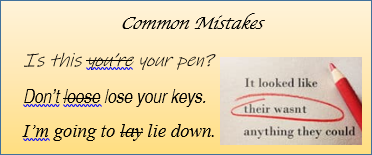Here is a list of some very common mistakes made when writing or speaking English:
Everyday vs every day
‘Everyday’ is an adjective and means ‘usual, normal’ – Tom is an everyday name.
‘Every day’ shows how often you do something – I get up at 7am every day.
Their vs there vs they’re
‘There’ is a possessive for ownership – it’s their house
‘There’ is a location – it’s over there
‘They’re’ is the contracted form of they are – they’re happy
Your vs you’re
‘Your’ is the possessive for ownership – it’s your pen
‘You’re’ is the contracted form of you are – you’re Japanese
I vs me
‘I’ is used as the subject of the verb – Tom and I went shopping.
‘Me’ is used as the object – Tom went shopping with me. He helped me.
Its vs it’s
‘Its’ is the possessive – I have a computer. Its screen is very large.
‘It’s’ is the contraction of it is – it’s a nice computer
Lie vs lay
‘Lie’ is intransitive (it has no object) – please lie down. [past tense – lay]
‘Lay’ is transitive (it has an object) – please lay the pen down. [past tense – laid]
Lose vs loose
‘Lose’ is a verb (past: lost) meaning to something goes missing, a loss – don’t lose my pen!
‘Loose’ is an adjective meaning not tight – my belt is loose.
Less vs fewer
‘Less’ is used for uncountable nouns – I have less money and less time now
‘Less’ is also used for numbers that measure distance, time or amount – less than 30% of the rice was good / There’s less than 2 hours to go / It’s less than 3km away
‘Fewer’ is used for countable nouns – I have fewer friends and fewer books than you
ラボール英会話教室.png)
